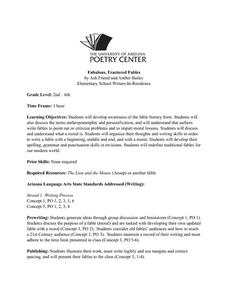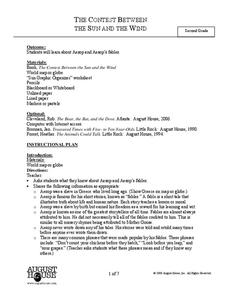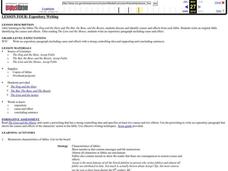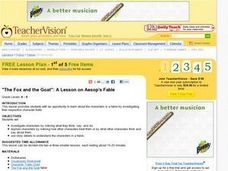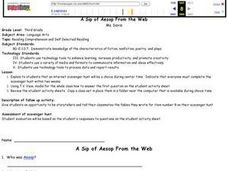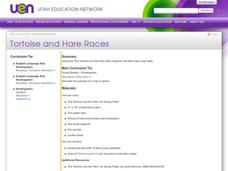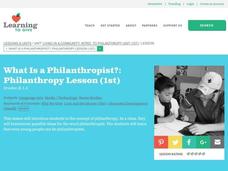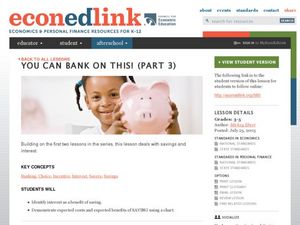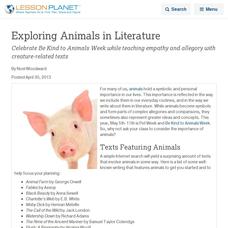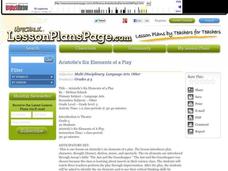Curated OER
Fabulous, Fractured Fables
Elementary schoolers develop an awareness of the literary form known as the fable. They explore how authors write fables to pass along moral lessons. After reading and discussing many famous fables embedded in the plan, learners attempt...
Thoughtful Education Press
Compare and Contrast
Encourage readers to compare and contrast the information that they find in informational text with a variety of reading passages and worksheets. Learners read all about subjects in science, social studies, and literature...
Curated OER
Fables Unit Lesson Plan
Students study fables in a broad context. In this literary lesson on fables, students define terms unique to them. Students use a variety of technological resources to gather and classify information into three categories. Students also...
Curated OER
The Contest Between The Sun And The Wind
Second graders read fables by Aesop and learn about the famous storyteller. For this fables lesson plan, 2nd graders discuss questions about Aesop and then write their own fable.
Curated OER
Expository Writing
Write an expository paragraph First, writers first read three fables and identify a cause and effect relationship in the fables. Then, they write their own expository paragraph with a cause and effect relationship. A list of...
Curated OER
The Lion and the Mouse
Learners write a story. For this critical thinking and writing lesson, students read a fable, answer the provided thinking skills questions, and write their own fable.
Curated OER
The Fox and the Goat
Students investigate characters' traits in a specific fable by noticing what they think, say, and do. They study key vocabulary and complete a vocabulary worksheet. They work in groups to discuss how you know if a person is kind.
Curated OER
A Sip of Aesop From the Web
Third graders answer specific questions by conducting an Internet scavenger hunt. They write their own fable after reading many different fables on the Internet. They questions that they answer are included in this lesson.
Curated OER
Reading Plot
In this problem and solution worksheet, 3rd graders read an Aesop fable and using a highlighter to highlight the problem and solution in the fable. Then students write the problem and solution in their own words. The worksheet gives 5...
Curated OER
Technology-commected Folklife Lesson Plan: Fables
Learners discuss ways the stories were alike and different. The teacher demonstrate how to draw a Venn diagram using Microsoft Word. They label the two circles and enter the likenesses and differences on the diagram.
Curated OER
Teaching Language Arts in Kindergarten Using Stories, Aesop's Fables, and Tall Tales
Students search into a variety of story elements in the eight lessons of this unit. The title, author, illustrator, setting, main character, problem, solution, events and the story are the components of the lessons.
Curated OER
Tortoise and Hare Races
Students listen to the fable, The Tortoise and the Hare, and participate in various map skill activities. They manipulate magnetic tortoises and hares on metal cookie sheets to practice direction, and construct racing tortoises out of...
Curated OER
Tortoise and Hare Races
Practice basic map skills with the story of The Tortoise and the Hare. After listening to the story, class members create a map that indicates the starting line, the path the animals took, where they stopped to rest, and the finish line....
Curated OER
What is a Philanthropist?
Students discuss the conceptual framework of philanthropy. For this introduction to philanthropy lesson, students define the term philanthropist and read the story Lion and the Mouse. Students discuss the concepts of philanthropy...
School Specialty
The Tortoise and the Hare - Drawing Conclusions/Predictions Outcomes
Does the fastest one always win the race? Look deeper into The Tortoise and the Hare with a set of discussion questions for before, during, and after reading the story.
Curated OER
What Difference Do Good and Bad Make?
Students discuss the characteristics of good citizenship, listen to the story, The Boy Who Cried Wolf, and develop and present skits demonstrating examples of good and bad behaviors.
Curated OER
Is It Hot in the Light?
Third graders make observations about the temperature of items in direct sunlight. In groups, they discuss why asphalt, brick and cement are warmer than items surrounding them. To end the lesson, they examine how heat transfers energy...
Curated OER
Helpful Animals and Compassionate Humans in Folklore
Students define elements of stories from around the world that include helpful animals. They explore animal character motivations and use graphic organizers to compare and contrast animal stories from different cultures.
Curated OER
Forecast Sunny and Warm
Students explore the concept of philanthropy. In this service learning lesson, students participate in hands-on activities that replicate building a foundation and providing for future generations.
Council for Economic Education
You Can Bank On This! (Part 3)
Young scholars use a chart to show how gaining interest is a beneficial part of having a savings account. In this banking lesson plan, students also learn about the workings of an ATM and a checking account.
Curated OER
Who's Got Game? The Lion or the Mouse?
Discuss bullying, folk tales, and more using this resource. Learners read the story The Lion and the Mouse by Toni and Slade Morrison, engage in cause and effect activities, make predictions, and discuss bullying. This is a motivating...
Curated OER
Exploring Animals in Literature
Celebrate Be Kind to Animals Week while teaching empathy and allegory with creature-related texts
Curated OER
Small Actions with Big Results
Students explore philanthropy in literature. In this literature lesson plan, students read text from three different genres that all have a moral. Students compare and contrast these pieces of literature, focusing on the character traits...
Curated OER
Aristotle's Six Elements Of A Play
Fifth graders view the play, The Ant and the Grasshopper. They define Aristotle's six elements of a play. At the end of the lesson, 5th graders be asked to participate in the play by acting like busy ants. This lesson would tie in nicely...


